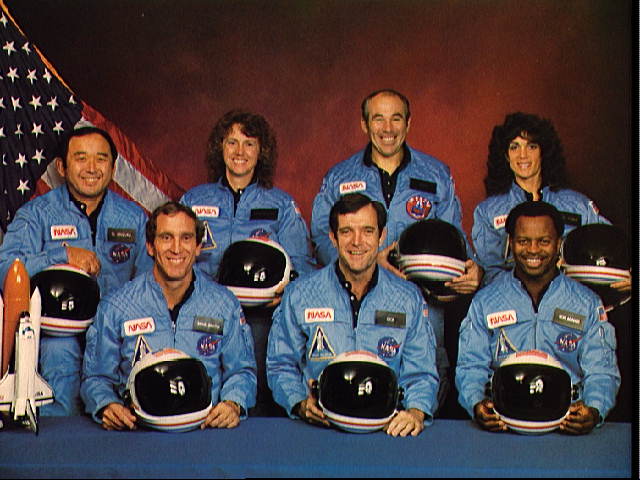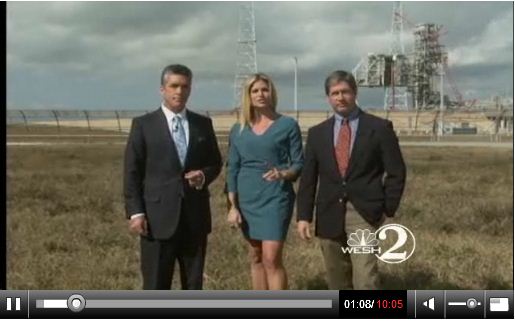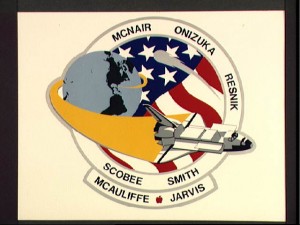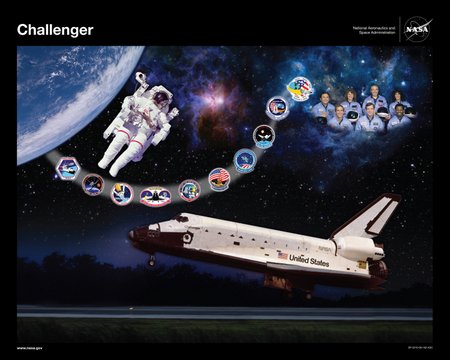Jan
29
25 years later – Challenger deserves better
- Photograph courtesy of NASA: Official portrait of the STS 51-L crewmembers. In the back row (l.-r.) Mission specialist Ellison S. Onizuka, Teacher in Space Participant Sharon Christa McAuliffe, Payload Specialist Greg Jarvis and Mission specialist Judy Resnik. In the front row (l.-r.) Pilot Mike Smith, Commander Dick Scobee, and Mission specialist Ron McNair.
Today (January 28th, 2011) marks the 25th anniversary of the Challenger shuttle disaster. Seven astronauts, including the first ever teacher-astronaut, lost their lives after the shuttle disintegrated just 73 seconds into its mission. Students all across America watched in horror as the whole thing was broadcast on live television. It’s one of those “you remember where you were when..” moments. At least, that’s what I’m told. Being just five years old, and on the other side of the Atlantic when it happened, I actually have no recollection of the event. I can only assume that I was not aware of it when it happened. I’m sure something like that would have stayed with me if I’d seen it.
Since I’ve become interested in spaceflight I’ve learnt more about the tragedy and spoken to people who do have personal memories of that fateful day. I’ve talked to people who worked with the astronauts on-board, I’ve gained an insight into the “NASA family”, seen how hard people work, and how much they care about their work and each other. That is one of the reasons I’m writing this post. The other reason is that I’m a journalist, I’m interested in news and coverage of big events.
I watched Orlando’s local news WESH-2 Challenger special with interest. I wanted to take a moment to remember those that lost their lives in the pursuit of space exploration. Within moments of starting the web stream I was already beginning to get worked up about it. Perhaps it’s an American thing, that they feel the need to trail the programme that is starting, as it starts, but it seemed particularly inappropriate in this case. I’m not talking about an opener that tells you about what’s in the programme, this was a full on “remember to watch this shocking programme” type trailer, just as the programme began. The tone of the very first sentence “Tonight – the doomed launch of space shuttle Challenger” felt wrong. It felt like a film trailer, not a serious retrospective piece.
It didn’t get better. Why they felt the need to have not one, but three presenters standing in front of the launch pad is beyond me. Did they have some squabble in the office about who should front this high-profile piece? Were the usual anchors so keen to get a piece of the action that they couldn’t just let their “space expert” Dan Billow take the lead? Seeing the three of them there in line reminded me of some sort of talent show. Perhaps I’d get to vote one of them off in a news version of American Idol? And don’t get me wrong, women should wear whatever they like, but I felt that the female presenter, Martha Sugalski could have chosen a slightly more sombre outfit. This isn’t a talent show, you’re not a magician’s assistant, this is a memmorial to seven people who died in one of the worst disasters of your nation’s space programme. Perhaps a slightly lower hemline would have been more appropriate?
When talking about 50 years of shuttle flights, Dan Billow didn’t need to be so gleeful about “the tears and the triumphs” of the programme? Isn’t it more usual to start on a positive? Again, I had a horrible feeling that they were not producing a sensitive memorial piece, but instead revelling in the excuse to relive disaster.
Now I’m a journalist, I know that big news stories, whilst sometimes horrific, are what we live for. The challenge, the adrenalin, the excitement of breaking news, but this is different, this happened 25 years ago. They are not reporting the disaster as it happens, with the unfolding horror, but instead presenting a retrospective. I’ve been told that “it’s local news, it’s always rubbish in the US”, but I don’t think there is any excuse for it. This is a big local story, you are the local station. You are in prime position to use your local contacts, get the local perspective, show how the tragedy affected things in your area, which is at the heart of the story. Instead, WESH-2 decided to hype up a much-told story, almost salivating over some of the most disturbing details, and not really bringing anything new to it.
You can’t fail to be moved by the pre-launch footage of teacher-astronaut Christa McAuliffe, speaking of her hopes that students will all tune in when she delivers her lessons from space. Her excitement and pride are clearly evident in her voice. The following footage, of the astronauts walking out to the crew vehicle, the countdown sequence and the fateful launch, would silence anyone with a heart. Thank goodness our trio of presenters had the sense to stay quiet and let the footage do the talking.
There’s an odd line about Christa’s “look-aike” sister to introduce footage of the families watching the launch from the bleachers at Banana Creek. It’s heartbreaking to hear them cheer and applaud, not realising what has just happened to their loved ones before their very eyes. I can hardly bring myself to watch as the truth dawns on them. This is very powerful footage. This is a real reminder that its not just astronauts on the shuttle, but real people. Real people, with real families. Real families that have just witnessed their worst fears unfold in front of them, with the world watching on television. There are no words.
In a moving statement, NASA’s Jesse Moore, Head of the Shuttle programme at the time (a fact that WESH-2 didn’t bother to mention in their aston) rightly called it a national tragedy. He announces that preliminary searches have not found any evidence that the crew had survived. This would be a good point for the programme to begin looking at how it affected the relatives of the astronauts who perished, what it meant for the space programme and the people who worked on the mission. Instead our merry band of presenters each take a portion of a sentence telling us that “At first many believed that the astronauts died in the initial explosion” “but it turns out that wasn’t the case at all, they were very much alive” “and they were fighting to survive. In a moment you’ll find out how they struggled to live”. Insert ad break. Classy. I mean seriously, who thought it was good idea in a Challenger anniversary special to basically say “stayed tuned to find out just how gory their deaths were after some people try to sell you a car”?
The programme spends some time explaining that the cold weather on launch day affected the O-rings which led to the disaster. They make a big thing of there being NASA engineers who had feared it could be a problem before launch. Startling revelations, if they were new, but they’re not. The official post-accident report acknowledges that cold weather was to blame and that there was a failure in the articulation of data to programme managers which should have prevented the launch being given the go-ahead in those conditions. I actually shouted at the screen when the presenter sneeringly describes how the NASA report presented the problem with “passionless precision”. What did he expect? It’s a scientific and engineering report – it has to be unemotional.
They then continue to drive home the idea that the astronauts were alive until they hit the water. It might be pertinent at this point to note that SpaceFlightNow.com’s live 2-hour broadcast this morning including one of the relatives talking about how the whole world knew how the astronauts died, but they wanted to show how they lived. She read out a note from her daughter who wrote at the time that not only had she watched her father die, but he died 100 times a day on television as news stations repeated the footage. A sobering thought.
The programme moves on to the Presidential committee that was investigating the accident. Behind commission chairman William Rogers, you can see the name plate for physicist Richard Feynman, who also sat on the committee. Despite this, and Feynman’s notoriety as a physicist, the programme labels him vaguely as “committee member”, oh yeah, and calls him David. FFS.
Now WESH-2′s space expert Dan Billow gets his chance at a solo. He tells us that following the report “the exploration of space fundamentally changed”. In his words: “The romance was gone” (no, it wasn’t, the romance of space flight will probably never die). “Spaceflight had always been about adventure, about pushing back the final frontier, but now it would be about reducing risk” (oh, so before Challenger they never tried to reduce the inherent risk to crews sitting atop of a vast quantity of rocket fuel? Really? Erm, excuse me while I quietly disagree with you completely). “About getting there and back in one piece” (see previous comment). “Gone was all the momentum (odd pause) of the glory days”.
Now remind me again of the title of this programme. Oh yes, it is called “Challenger: 25 years later”. I’m not sure why you decided this was a good programme to include a jaunty little a montage of historical launch footage accompanied by a foot-tapping Steppenwolf track. Just moments ago we were talking about people dying, about systemic failures at NASA, suddenly we’re bopping along remembering “the glory days”. Conveniently enough, this glory days montage doesn’t happen to include the Apollo 1 fire that killed three astronauts on the pad before they even had a chance of launching. It does show a malfunction of a lunar landing research vehicle that almost claimed the life of Neil Armstrong, though cuts before the vehicle hits the ground and explodes, and glosses over the near death experiences of the Apollo 13 astronauts
Popout
Oh wait, that’s okay, because as soon as the stock footage and the funky tune are over, our trusty trio are back to remind us that “even the glory days had their dark moments”. Straight out of their oddly placed upbeat video clips they remind us of the deadly Apollo 1 incident which claimed the lives of astronauts Gus Grissom, Ed White and Roger Chaffee in 1967.
The Columbia disaster gets some attention too. Although I’m afraid I’m going to get picky again. “The loss of the shuttle Columbia on February 1st, 2003 reminded us of the risk; reminded us of how complicated the shuttle is to fly and land, and showed us that NASA had gotten lazy”.
Two things: Of course spaceflight is risky, it always has been. Everyone who works on the shuttle programme knows that. The media, (and perhaps as a direct result, the public) might have got bored of shuttle launches because they were becoming more commonplace, but anyone who works in spaceflight is all too aware of the risks involved.
Secondly, I think that saying “NASA had gotten lazy” is a bit judgemental here. They may have forgotten some of the lessons learnt from Challenger, but to coin a phrase from Ben Goldacre, “I think you’ll find it’s a little more complicated than that”. From what I understand, although NASA knew that a piece of foam had come off the shuttle during launch, they were limited in their ability to evaluate the damage not through laziness, but through the complexities of military secrecy. Although satellites owned by the US Department of Defence may have been able to provide high resolution images of the shuttle, they were so top secret at the time, that requests to use them were denied.
Twenty-one and a half minutes in, we are finally told that “The history of the space shuttle programme is not a story of tragedy and death”. Well that’s a turn around, considering you’ve spent the entire programme up until now showing that you think it is just that.
But wait, space expert Dan Billow still has an ace up his sleeve. “If the Apollo era is rock and roll, the shuttle era is a slow waltz”. Cue shuttle footage accompanied by Strauss’s Blue Danube waltz – except wait, hang on, that’s not the shuttle, that’s the ISS, so’s that, and that, and.. oh I give up.
Finally we’re back on to something that is relevant to the loss of Challenger, president Ronald Reagan’s memorial address from 1986. WESH-2, perhaps you should listen more closely to that speech. He says “The best we can do is remember our astronauts, our Challenger seven, remember them as they lived”.
So what have we learnt from this programme? We’ve learnt that less is more when it comes to local news presenters, that Dan Billow is often slightly late with his cues, and that no matter what it’s surrounded by, footage of the Challenger launch, mission control and the families will take your breath away.
What we haven’t learnt, despite the “Challenger: 25 years later” title is anything that has happened in the 25 years since the tragedy.
WESH-2 missed a trick with this programme. Whilst local news usually tries to shoe-horn a local angle on a national story, this actually happened on their patch. Their local story was the national news. They’re on the space coast, many people will have memories of watching this with their own eyes, not just on the television, couldn’t we have heard from them? What about the school children who would have been watching expectantly as the first teacher was launched into space? How did it affect the enormous space community that lives and works in the area? What about the relatives of the astronauts? What is being done at Kennedy Space Centre to commemorate the Challenger seven?
Why didn’t they talk to anyone from NASA about how it affected the way they work? About the future of the space programme? I know the stock footage is powerful, but so are personal accounts and memories.
I watched some of SpaceFlightNow.com’s live broadcast with Miles O’Brien this morning. My internet connection was playing up so I missed a lot of it, but the tone was so different. They spoke to relatives, to NASA employees, and featured the Challenger Education Centre where a group of schoolchildren were playing at being mission controllers. It was respectful, it was moving, it was hopeful. It reminded us that the astronauts themselves would have wanted the exploration of space to continue. It was completely different to WESH-2′s effort.
Inspired by Dan Billow’s musical analogy, I’d say this: If Space Flight Now’s broadcast was symphony playing a gentle Debussy piece, WESH-2′s Challenger special was a primary school recorder choir playing the music to ‘Psycho’ – over-excitable, brash and out of tune.
Right, now I’ve got this out of my system I’m going to spend a quiet moment thinking about all those who’ve lost their lives in pursuit of space. I’ll also thinking of their families and wish for safe and successful launches for the remaining shuttle crews.
Comments on this blog, pre-crash, saved via internet caches:
3 Responses to “25 years later – Challenger deserves better“
Alan says:
ReplyI was 13 (nearly 14), and I remember it to this day.
I remember the final words between mission control and Challenger (“Go for throttle up”).
I remember the following morning when I went to do my paper-round, that every front page had an image.
I also remember in the weeks prior to launch Christa McAuliffe being on TV, “Newsround” in particular.
The mission was one that was perhaps receiving a higher than usual amount of publicity. It seems it was nearing the level of the very first shuttle mission.
I haven’t seen the programme that you refer to, nor do I particularly want to. We should remember Challenger, and Columbia, and I’m not sure that this programme is particularly fitting (based on what you have written), which makes me incredibly sad.
The space programmes globally have advanced our human knowledge incredibly, and everytime there is a manned launch, those people put their lives at risk and sadly some don’t come back. RIP Challenger.
@tontowilliams
Shannon (@ageekmom)says:
ReplySuperbly stated, Kate. I watched both WESH’s piece and much of SpaceFlightNow’s coverage and the latter was far more professional, comprehensive and interesting. SpaceFlightNow pulled in all the right players and struck the right tone throughout the day.
Mike (@FCTMike)says:
ReplySorry, I’m a bit behind in my blog reading! Great piece Kate! As I type this, you’re on the space coast just after the successful discovery launch! Anyway, I wanted to be sure you saw this piece that NPR did around the Challenger anniversary. I heard it on my way into work (at JSC, BTW), and it really got to me – in a very good way.
Teacher Recalls Class Watching Challenger Explode:
http://www.npr.org/2011/01/28/133293555/Teacher-Recalls-Watching-Challenger-ExplodeI recommend listening to the story vs. reading the transcript though.
Mike





